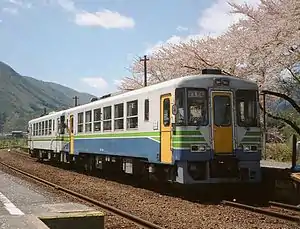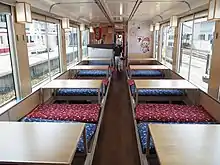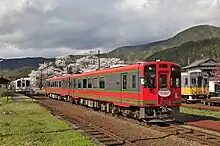| Aizu Line | |
|---|---|
 Aizu Railway AT-150 series DMU at Ashinomaki-Onsen Station, April 2001 | |
| Overview | |
| Status | In operation |
| Owner | Aizu Railway |
| Locale | Fukushima Prefecture |
| Termini | |
| Stations | 21 |
| Service | |
| Type | Heavy rail |
| Operator(s) | Aizu Railway |
| History | |
| Opened | 1 November 1927 |
| Technical | |
| Line length | 57.4 km (35.7 mi) |
| Number of tracks | Entire line single tracked |
| Character | Rural |
| Track gauge | 1,067 mm (3 ft 6 in) |
| Electrification | 1,500 V DC (Aizu-Tajima — Aizukōgen-Ozeguchi) |
| Operating speed | 85 km/h (53 mph) |
The Aizu Railway Aizu Line (会津鉄道会津線, Aizu Tetsudō Aizu-sen) is a 57.4 km (35.7 mi) long railway line from Nishi-Wakamatsu Station in Aizuwakamatsu to Aizukōgen-Ozeguchi Station in Minamiaizu, Fukushima, Japan. It is owned and operated by Aizu Railway.
Services
The train operation is controlled from Aizu-Tajima Station. The electrified southern part goes beyond the Aizukōgen-Ozeguchi terminus onto the Yagan Railway Aizu Kinugawa Line, Tobu Railway and JR East all the way to Tokyo. The non-electrified northern part runs a diesel service beyond Nishi-Wakamatsu Station to Aizu-Wakamatsu Station on the JR East Tadami Line.
Stations
- All stations are located in Fukushima Prefecture.
- Local trains stop at all stations.
- Stations stopped at by all trains are marked "●".
- Stations stopped at by some of the trains are marked "◆".
- Limited Express train Revaty Aizu[1] which goes to and departs from Asakusa Station and does not stop at any stations on the Aizu Line except Aizu-Tajima and Aizukogen-Ozeguchi Station.
- The service called Sightseeing Rapid, Open-car "torokko" Ozatoro Tenbō Ressha ,[2] is operated by Aizu Railway and/or Yagan Railway. Each separate train stops at different locations depending on its name. For example, Yu-Meguri(湯めぐり), which is operated by Yagan Railway runs from Kinugawaonsen Station to Aizu-Tajima Station. As another example, Aizu Roman (会津浪漫号), which is operated by Aizu Railway runs between Aizu-Tajima Station and Aizu-Wakamatsu Station. Reserving a seat on this train costs 320 yen (adult). You can choose one of three seat types (Tatami and Kotatsu,[3] Open Car Truck,[4] Dome Car during which there are reclining seats). Passengers may purchase a ticket at stations where staff is present, or they may ask the train crew to sell them a ticket when they board the train.



| Station | Japanese | Distance (km) | Aizu Mount Express | Rapid Relay | Revaty Aizu | Open-car "torokko" Ozatoro Tenbō Ressha |
Transfers | Location | |
|---|---|---|---|---|---|---|---|---|---|
| Between stations |
Total | ||||||||
| through operation to/from Aizu-Wakamatsu on the Tadami Line | |||||||||
| Nishi-Wakamatsu | 西若松 | - | 0.0 | ● | ● | ● | Tadami Line (for Koide) | Aizuwakamatsu | |
| Minami-Wakamatsu | 南若松 | 3.0 | 3.0 | ● | ↕ | ↕ | |||
| Monden | 門田 | 1.9 | 4.9 | ● | ↕ | ↕ | |||
| Amaya | あまや | 2.8 | 7.7 | ● | ↕ | ↕ | |||
| Ashinomaki-Onsen | 芦ノ牧温泉 | 2.8 | 10.5 | ● | ● | ● | |||
| Ōkawadamukōen | 大川ダム公園 | 5.7 | 16.2 | ● | ↕ | ↕ | |||
| Ashinomaki-Onsen-Minami | 芦ノ牧温泉南 | 1.5 | 17.7 | ● | ↕ | ↕ | |||
| Yunokami-Onsen | 湯野上温泉 | 5.0 | 22.7 | ● | ● | ● | Shimogō, Minamiaizu District | ||
| Tō-no-Hetsuri | 塔のへつり | 3.8 | 26.5 | ● | ● | ● | |||
| Yagoshima | 弥五島 | 1.5 | 28.0 | ● | ↕ | ↕ | |||
| Aizu-Shimogō | 会津下郷 | 3.1 | 31.1 | ● | ● | ● | |||
| Furusato-Kōen | ふるさと公園 | 1.4 | 32.5 | ● | ↕ | ↕ | |||
| Yōson-Kōen | 養鱒公園 | 2.6 | 35.1 | ● | ↕ | ↕ | |||
| Aizu-Nagano | 会津長野 | 2.2 | 37.3 | ● | ↕ | ↕ | Minamiaizu, Minamiaizu District | ||
| Tajimakōkōmae | 田島高校前 | 2.2 | 39.5 | ● | ↕ | ↕ | |||
| Aizu-Tajima | 会津田島 | 2.5 | 42.0 | ● | ● | ● | ● | ||
| Nakaarai | 中荒井 | 3.8 | 45.8 | ◆ | ↕ | ↑ | |||
| Aizu-Arakai | 会津荒海 | 3.4 | 49.2 | ◆ | ↕ | ↑ | |||
| Aizu-Sanson-Dōjō | 会津山村道場 | 0.9 | 50.1 | ◆ | ↕ | ↑ | |||
| Nanatsugatake-Tozanguchi | 七ヶ岳登山口 | 3.0 | 53.1 | ◆ | ↕ | ↑ | |||
| Aizukōgen-Ozeguchi | 会津高原尾瀬口 | 4.3 | 57.4 | ● | ● | ● | Yagan Railway Aizu Kinugawa Line (through operation) | ||
| through operation to/from Yagan Railway Aizu Kinugawa Line | |||||||||
History
The Aizu Line was constructed between 1927 and 1953 by the Japanese National Railways (JNR) as part of a plan to build a direct line from Aizu-Wakamatsu to Tokyo. The Aizu line was the northern section, whilst the Yagan Railway Aizu Kinugawa Line was to be the southern section. Despite the Kinugawa line connecting to the Aizu line in 1986, the Aizu Line was deemed an unprofitable secondary line and transferred to a company established by local governments in 1987.
The Aizukōgen-Ozeguchi - Aizu-Tajima section was electrified at 1500 VDC in 1990 to facilitate through-running onto the Kinugawa line.
Timeline
- November 1, 1927: Nishi-Wakamatsu - Ashimomaki-Onsen section (10.5 km) opens
- December 22, 1932: Ashimomaki-Onsen - Yunokami-Onsen section opens
- December 27, 1934: Yunokami-Onsen - Aizu-Tajima section opens
- December 12, 1947: Aizu-Tajima - Nanatsugatake-Tozanguchi section opens
- November 8, 1953: Nanatsugatake-Tozanguchi - Aizukōgen-Ozeguchi
- December 1, 1980: The 12.2 km deviation between Ashimomaki-Onsen and Yunokami-Onsen opens as part of the construction of the Okawa Dam
- April 1, 1987: Line transferred to East Japan Railway Company (JR East) upon privatization of JNR
- July 16, 1987: Line transferred to Aizu Railway
- October 12, 1990: Aizu-Tajima — Aizukōgen-Ozeguchi section electrified (1500 V DC), direct service to the Yagan Railway Aizu Kinugawa Line begins
- April 1, 1999: Japan Freight Railway Company (JR Freight) ends operations
- April 22, 2017: Revaty Aizu uses Tobu 500 series which belongs to Tobu Railway has been commenced operating.
- March 12, 2022: Revaty Aizu has been the only electric train as a train, which runs on Aizu Line because Aizu Railway stopped interconnecting with Yagan Railway except for Revaty Aizu. Simultaneously, Aizu Railway lost the only electric train that Tobu 6050-100 series.
References
This article incorporates material from the corresponding article in the Japanese Wikipedia.
- ↑ Tobu Limited Express Revaty Aizu which uses Tobu 500 series. When you get on and off at the stations in between Kinugawaonsen Station and Aizu-Tajima Station, you're able to ride on this limited express train without limited express tickets. So, you don't have to make and purchase a reservation Limited Express Ticket. But, if you don't make a reservation for any seat, you may have to offer your seat to a passenger who has made a reservation. You must reserve a seat and purchase a Limited Express Ticket when you get on and off at stations between Aizu-Tajima Station and Asakusa Station except for when you ride the train between Aizu-Tajima Station and Kinugawaonsen Station only,
- ↑ Yumeguri
- ↑ Kotatsu service is carried out service days during winter
- ↑ Opening windows service is carried out on service days excluding the winter
External links
- Aizu Railway Aizu Line Station Guide (in Japanese)